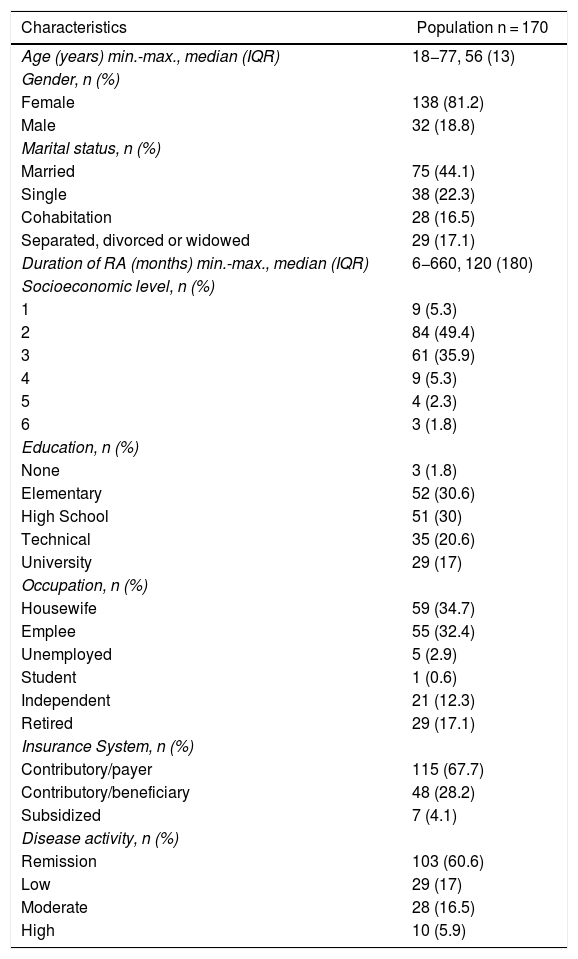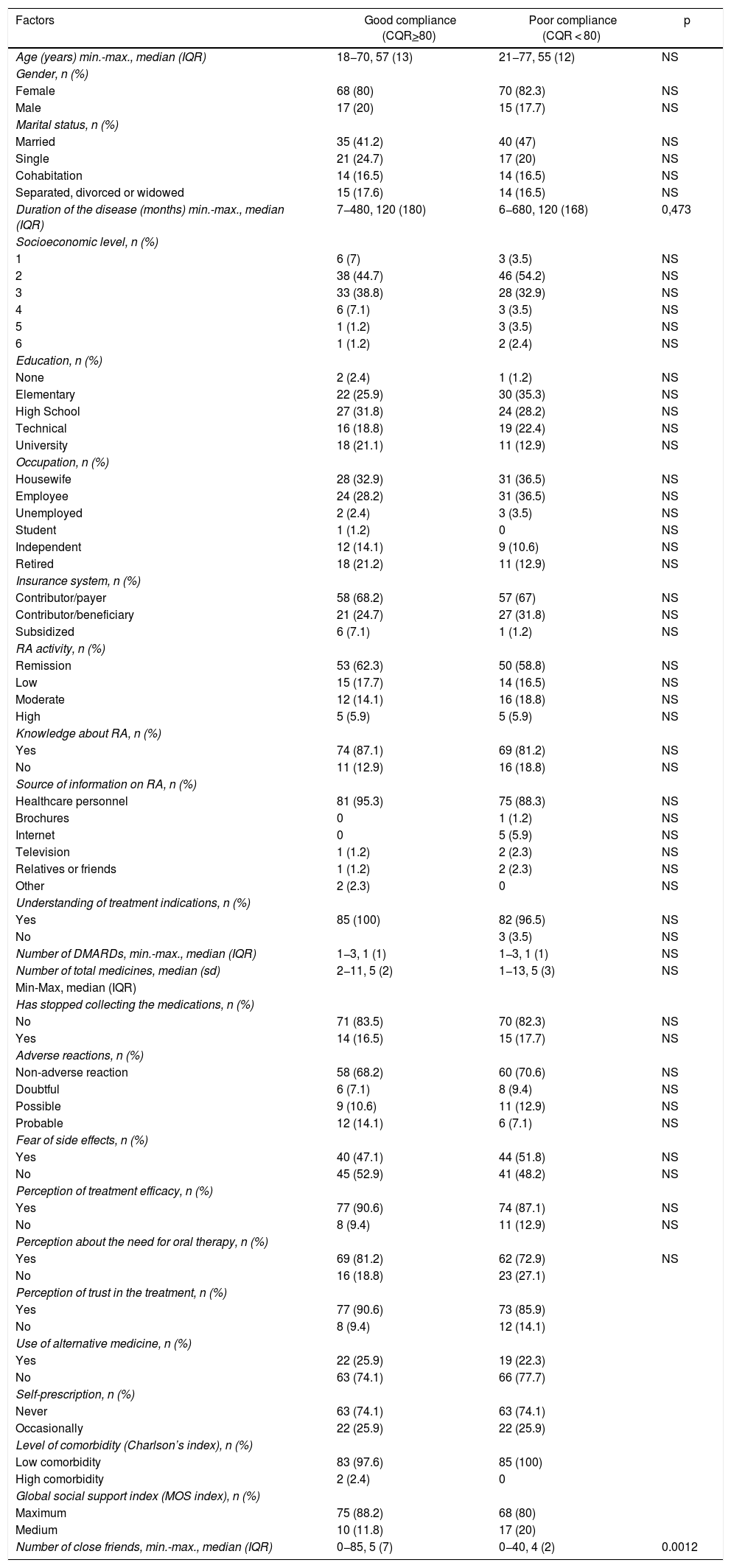The use of disease modifying antirheumatic drugs (DMARDs) in patients with rheumatoid arthritis (RA) is essential in order to achieve and maintain adequate disease control, and thus preventing irreversible functional damage. However, the rate of adherence to drug therapy has been reported to be between 20% and 107%. This variability may be due to the measurement methods used in the different studies.
ObjectiveTo test the overall medication adherence to oral treatment with DMARD in patients with RA using the self-report Spanish version Compliance-Questionnaire-Rheumatology (CQR) and to identify potential factors associated with non-adherence.
MethodsA cross-sectional descriptive study was conducted that included patients older than 18 years with RA diagnosed according to the ACR-EULAR 2010 criteria. They also had to have been prescribed oral DMARD for the previous 3 months, and had been seen by a rheumatologist in the last year. Patients completed the CQR to assess adherence, and were asked about disease knowledge, perception about treatment, side effects, Charlson Comorbidity Index, global index of social support, number of medications and DMARD prescribed, access to health resources, and disease activity measured by DAS 28 or CDAI. Good adherence was defined as a cut-off point of CQR > 80 or non-activity (remission or low activity). In the search for factors associated with adherence, the data were analysed using means of median and interquartile range, as well as frequencies and proportions. The comparison between adherent and non-adherent groups was performed using absolute comparisons, with the Mann-Whitney test for continuous, and chi-squared (for expected values> 5), or Fisher (for expected values <5) tests for categorical variables, taking as a level of significance a value of p < 0.05. OR and their respective 95% confidence intervals (95% CI) were used.
ResultsOf 170 participants included, 50% (n = 85) had a value greater than 80% (good drug adherence). Most patients had remission (60.6%) or low disease activity (17%). The subsequent analysis showed statistically significant association between adherence measured by CQR and the number of friends (P = .0012). An association was also found between disease activity as an indirect indicator of adherence and the global social support index (P = .004).
ConclusionThis study found a similar level of adherence to that reported in other populations, which could be due to the behaviour of our population, although the authors perceived difficulties reported by patients in understanding the statements of the questionnaire at all levels of education. Only the social support variables had a statistically significant relationship with adherence, which had also been described in the literature. Further studies are required to evaluate the operational characteristics of the CQR in our population.
el uso de los fármacos modificadores de la enfermedad (FAME) en pacientes con artritis reumatoide (AR) es esencial para alcanzar y mantener un control adecuado de la enfermedad y prevenir un daño funcional irreversible. Sin embargo, la tasa de adherencia a la terapia farmacológica varía entre el 20% y el 107%. Esta variabilidad puede deberse a los métodos de medición utilizados en los diferentes estudios.
Objetivoevaluar la adherencia global al tratamiento oral con FAME en pacientes con AR mediante el autodiligenciamiento del cuestionario Compliance Questionnaire on Rheumatology (CQR) y la actividad de la enfermedad e identificar los factores potenciales asociados con la baja adherencia.
Métodosestudio descriptivo transversal que incluyó pacientes mayores de 18 años con AR clasificados por criterios ACR-EULAR 2010 y con prescripción de FAME durante al menos tres meses y control con reumatólogo en el último año. Los participantes llenaron el cuestionario CQR y se les indagó acerca del conocimiento de la enfermedad, la percepción sobre el tratamiento, los efectos adversos, el índice de comorbilidad de Charlson, el índice global de apoyo social, el número de medicamentos y FAME prescritos, el acceso a los servicios de salud y la actividad de la enfermedad por DAS 28 o CDAI. Se definió como buena adherencia un punto de corte de CQR > 80 y ausencia de actividad (remisión o actividad baja). Para la búsqueda de factores asociados con adherencia se analizaron los datos por medio de mediana y rango intercuartílico, así como frecuencias y proporciones. La comparación entre los grupos de adherentes y no adherentes se hizo con comparaciones absolutas, por medio de test de Mann-Whitney para las variables continuas y chi-cuadrado (para valores esperados >5), o Fisher (para valor esperado < 5) para variables categóricas, tomando como nivel de significancia un valor de p < 0,05. Se utilizaron OR y sus respectivos intervalos de confianza al 95% (IC 95%).
Resultadosde los 170 participantes incluidos, el 50% (n = 85) tuvo un valor de CQR mayor a 80 (buena adherencia). La mayoría de los pacientes se encontraba en remisión (60,6%) o baja actividad de la enfermedad (17%). El análisis posterior únicamente encontró asociación estadísticamente significativa entre adherencia medida por CQR y el número de amigos (p = 0,0012) y entre adherencia medida por actividad de la enfermedad y el índice de soporte social global (p = 0,004).
Conclusioneseste estudio muestra un nivel de adherencia similar al reportado en otras poblaciones, lo cual puede deberse a comportamientos propios de nuestra población, aunque los autores percibieron dificultades reportadas por los pacientes en el entendimiento de los enunciados del instrumento en todos los niveles de escolaridad. Únicamente las variables de soporte social tuvieron una asociación estadísticamente significativa con la adherencia, asociación descrita en la literatura. Se requieren más estudios para evaluar las características operacionales del CQR en nuestra población.







